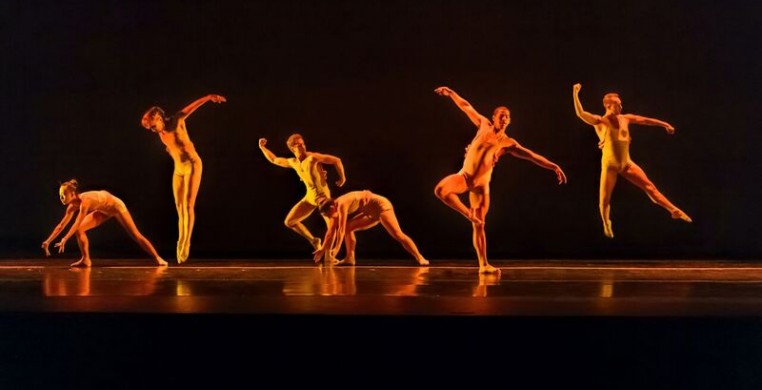Notable Thodos Dance Chicago alumni Brock Clawson and Jeremy Blair joined Artistic Director Melissa Thodos and Executive Director Gail Ford onstage at the Athenaeum Theatre Saturday, July 16 to unveil the company’s 25th anniversary logo and kick off the 16th edition of New Dances. Now an acclaimed choreographer, Clawson praised the New Dances process as instrumental in finding his calling and establishing a body of work, while Blair cited the trifecta of dancing, teaching, and choreographing central to Thodos’ mission as a vehicle toward a career in higher education. Melissa Thodos’ unwavering support for her dancers is never more clear than at New Dances, a platform for emerging artists (most from within the company) to show off their work in a top-notch production. Along the way, each choreographer (8 from the company plus a guest) is mentored by a panel plucked from the upper echelon of Chicago’s dance scene, and the results of this process are apparent in the tremendous growth demonstrated by its repeat offenders.
Like most years, this New Dances was robust in production value and length. Unlike previous editions, however, the dances didn’t all run together. Despite most of the choreographers working together day in and out, each had a distinct voice and unique movement vocabulary, making it a less exhausting evening than usual. Especially standing out from the pack was Hattie Haggard’s “Show a Little Taste,” a humorous homage to baking that came across part “Flabbergast” (Gustavo Ramirez Sansano’s signature work for the defunct Luna Negra Dance Theatre) and part “Minus 16.” A glorious flour fight and smart use of repetition, plus rich characterization for Haggard’s pack of 10 sous chefs come together with her brilliant sense for comedic timing.
Less silly, but equally fun was Tenley Dorrill’s “Mambo Clap Wozam Slap,” a pure dance delight channeling African and Latin rhythms. Dorrill is a central dancer in her own piece, and why not? It looks incredibly fun to do. Also appearing in her own work is veteran dancer and choreographer Jessica Miller Tomlinson in R.O.C.B. Tomlinson usually knocks it out of the park, and R.O.C.B. is no exception. Lots of serious dancing set to Heinrich Biber’s minor key “Passaglia” might come across as meh if not for Tomlinson’s droll references to hunger. Dancer Anna Long starts by biting her finger, and the whole group degrades into a “hangry” abyss. The final moment, the music’s only major chord invoking the dancers to lick their arms, is especially satisfying.
John Cartwright’s contribution took more risks than usual, including a second choreographer: theatre and circus artist Danielle Gennaoui. “Passive Voices” was perhaps the most patient work on the program, exploring technology’s effect on human connection. The use of text was appropriate, but nearly inaudible. I didn’t mind not understanding what the dancers were saying – it contributed to the “lost in communication” theme – but undoubtedly not the choreographers’ objective. Abby Ellison’s “Everywhere but Here” shared exactly the same topic as Cartwright and Gennaoui, though Ellison takes a more literal approach with gestures referencing society’s obsession for distraction. A group of dancers hold up one palm in front of their faces, mimicking a smart phone, as the others struggle to gain their attention, to no avail.
Others on the program are perhaps more conventional, but still quite lovely. Guest artist Shannon Alvis’ “Sunrise” gave off feelings of shock, fragility, instability as the dancers weeble wobble in each others’ arms. Supported by an Arvo Part-like score by Ezio Bosso, beautifully warm contributions from Nathan Tomlinson and Nathan Rohrer (lighting and costumes, respectively) and exceptional dancing, “Sunrise” might be depressing if it weren’t so pretty to look at.

